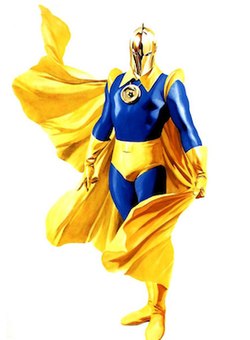It has been suggested that this article be merged with Doctor Fate . ( Discuss ) Proposed since September 2025. |
| Doctor Fate | |
|---|---|
 Kent Nelson as Doctor Fate, as depicted in Mythology: The DC Comics Art of Alex Ross (November 2005). | |
| Publication information | |
| Publisher | DC Comics |
| First appearance | More Fun Comics #55 (May 1940) |
| Created by |
|
| In-story information | |
| Alter ego | Dr. Kent Nelson |
| Species | Human |
| Team affiliations | Lords of Order Justice Society of America Justice Society Dark Justice League Dark Justice League Justice League International Sentinels of Magic All-Star Squadron |
| Partnerships | Nabu Shat-Ru Doctor Fate (Inza Cramer) Doctor Fate (Khalid Nassour) Salem the Witch Girl |
| Notable aliases | Fate Immortal Doctor Fate [1] Ageless Archmage [2] Golden Age Doctor Fate |
| Abilities |
|
| Altered in-story information for adaptations to other media | |
| Alter ego | Earth's Sorcerer Supreme |
Dr. Kent Nelson is a superhero who appears in American comic books published by DC Comics. Created by Gardner Fox and Howard Sherman, the character first appeared More Fun Comics #55 (May, 1940) during the Golden Age of Comic Books. The original version of the Doctor Fate character, he is sometimes also referred to as the Golden Age Doctor Fate.
Contents
- Creation
- Publication history
- Golden Age of Comics
- Silver & Bronze Age of Comics
- Modern Age of Comics
- Fictional character biography
- 20th century
- 21st Century
- Characterization
- Description and themes
- Familial connections
- Powers, abilities, and resources
- Mystical artifacts and resources
- Weaknesses and costs
- Other versions
- Supporting characters
- Enemies
- Collected editions
- In other media
- Television
- Film
- Video games
- References
- External links
Nelson is an archaeologist who encounters a cosmic being named Nabu, a member of the Lords of Order, while accompanying his father in an archaeological expedition in this youth. Unwittingly leading to his father's death upon releasing Nabu, the being pities him and raises him as a sorcerer although various retellings differ in Nabu's intentions and how Nelson is trained. Gifted the Helmet of Fate and several other artifacts, he becomes the hero and agent of the Lords of Order, Doctor Fate. [3] A major character featured in titles based upon several teams such as the Justice Society of America, Justice League International, and Justice League, and one of the foremost sorcerers in the DC Universe, Nelson's most reoccurring conflict is his gradual loss of personal agency to Nabu and its effects on his relationships with others, including his love interest Inza Nelson. [1] Subjected to various comic book deaths, Nelson has been succeeded by several successors, most notably by his grand-nephew and apprentice, Khalid Nassour. [4] Despite his demise in the mainstream continuity, Nelson's version often makes posthumous appearances in various comic book depicting events in the past.
As most recognized version of Doctor Fate, Kent Nelson has made many appearances in various adaptations. Nelson first made his live-action debut in the television series Smallville , portrayed by Brent Stait. He also appears in the DC Extended Universe film Black Adam (2022), portrayed by Pierce Brosnan. The character appeared in the DC Animated Universe, voiced by George DelHoyo in the Superman: The Animated Series and Oded Fehr in Justice League and Justice League Unlimited.


